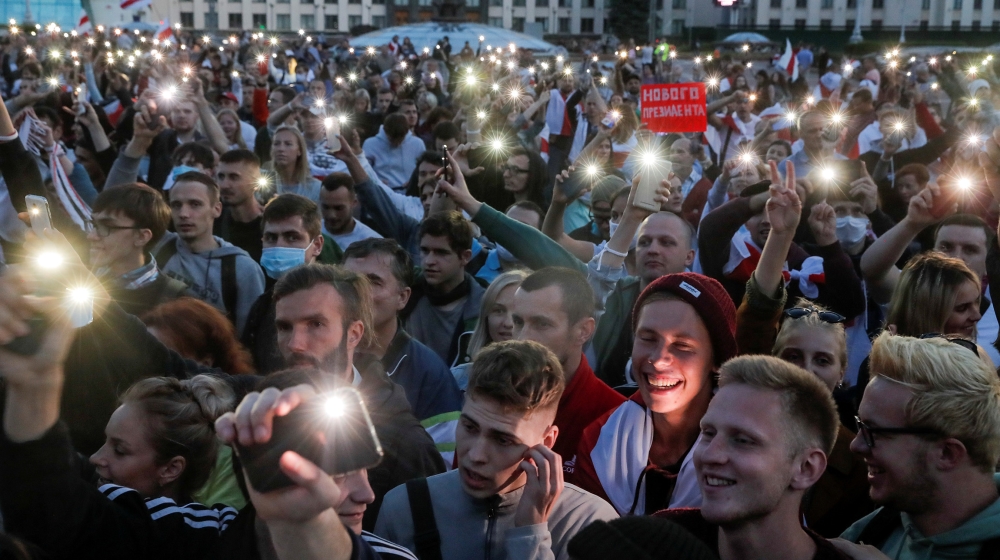Tens of thousands of anti-Lukashenko demonstrators rally in Minsk
Protesters defy warnings to demand president’s departure, in latest wave of protests against his disputed re-election.
Belarusian President Alexander Lukashenko has made a show of defiance against the massive protests demanding his resignation, toting a rifle and wearing a bulletproof vest as he strode off a helicopter that landed at his residence while demonstrators massed nearby.
In the 15th day of the largest and most determined protests ever in Belarus, a crowd of about 200,000 rallied on Sunday against Lukashenko in a square in the capital of Minsk, defying warnings.
They then marched to another rally and approached the Independence Palace, the president’s working residence.
Video from the state news agency Belta showed a government helicopter landing on the grounds and Lukashenko getting off holding what appeared to be a Kalashnikov-type automatic rifle.
No ammunition clip was visible in the weapon, suggesting that Lukashenko aimed only to make a show of aggression.
The streets surrounding Independence Square turned red and white as demonstrators carried flags symbolising their opposition to Lukashenko, who has been in power since 1994.
Al Jazeera’s Step Vaessen, reporting from Minsk, said there was “quite a festive atmosphere” at the “huge rally”, with the crowds singing slogans and shouting slogans for Lukashenko to leave office “while the authorities kept ordering them to leave the square”.
Lukashenko has previously dispatched riot police to disperse rallies that erupted after he claimed a sixth presidential term in an August 9 election that critics say was rigged.
Officials on Sunday warned Belarusians against participating in “illegal demonstrations” and local news outlets published videos on social media showing water cannon and riot police with shields moving towards Independence Square.
The defence ministry, meanwhile, said it would intervene to protect World War II memorials, which it described as “sacred places”, and four metro stations in central Minsk were closed.
“We categorically warn: any violation of peace and order in such places – you will have the army to deal with now, not the police,” it said in a statement. “We, soldiers, will not allow these places to be desecrated, there can be no fascism there!”
Vaessen said that along with riot police, dozens of military trucks carrying soldiers had also made their way to the centre of the capital.
“It was the first time we saw the military being deployed right here in the heart of Minsk. There was a lot of concern that there would be this violent crackdown but that didn’t deter anyone. People just came streaming in,” Vaessen said, adding that protesters say “they have no fear anymore”.
Solidarity rallies were also due in neighbouring Lithuania, where demonstrators planned to form a human chain from Vilnius to the Belarus border, three decades after residents of the Baltic states joined hands and linked their capital cities in a mass protest against Soviet rule.
The European Union has rejected the results of the presidential election that gave Lukashenko 80 percent of the vote.
The bloc has also promised to sanction Belarusians responsible for ballot fraud and a post-election police crackdown that saw nearly 7,000 people arrested and sparked gruesome allegations of torture and abuse in police custody.
Lukashenko has brushed aside calls to step down, dismissed the possibility of holding a new vote and instructed his security services to quell unrest and secure the borders.
His opponents have organised strikes and the largest protests in the ex-Soviet country’s recent history over his re-election, with more than 100,000 people turning out in Minsk last weekend.
Yet fewer workers at state-run factories – usually a bastion of support for Lukashenko – have continued to strike, with activists citing pressure from the authorities.
Belarusian opposition leader Svetlana Tikhanovskaya has said her country’s people have changed and will no longer accept Lukashenko.
Tikhanovskaya, who has fled to neighbouring Lithuania citing safety concerns, said Lukashenko should “step away” and “it is better for everybody”.
“Sooner or later he will have to step away. It’s better for everybody. It’s better for the country if it will happen in the shortest time,” the 37-year-old leader told Al Jazeera.
“The Belarusian people have changed. They will never accept the old authorities.”
Russian Foreign Minister Sergey Lavrov, meanwhile, accused Belarusian opposition members who left the country during recent protests of seeking “bloodshed”, according to the RIA news agency.
Lavrov said on Sunday it would be impossible to prove Lukashenko did not win the election in the absence of international observers.
He also said Moscow calls for the launch of a genuinely broad national dialogue in Belarus.
Lukashenko has threatened to shut down production lines from Monday where workers have put down their tools.
Lukashenko’s military inspection this weekend came ahead of large-scale military exercises planned on the border with the EU between August 28 and 31.
Source: Read Full Article





